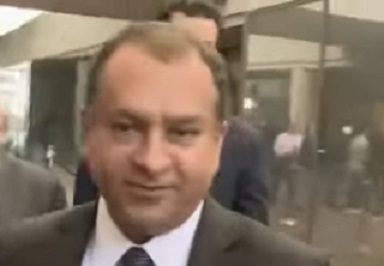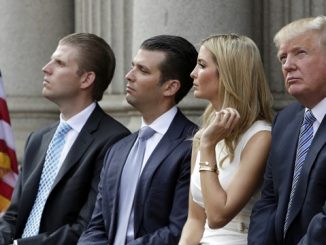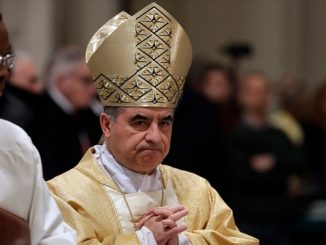
When Elizabeth Holmes dropped out of college at 19 to found her company, Theranos, she needed someone with more experience. Based on an idea that hundreds of diseases could be diagnosed with just a few drops of blood, her venture had begun to attract interest, and investment.
So as the company grew, Holmes, still in her mid-20s, brought in a man that she already knew. Ramesh ‘Sunny’ Balwani was someone who understood how to run a successful start-up.
She’d reportedly first met him during a college trip to Beijing when she was 18. He was a 37-year-old South Asian immigrant who had made millions selling his software company before the dot-com bubble burst. Around the same time he met Holmes, he divorced his wife, a Japanese artist. And at some point, the relationship became a romantic one.
While Holmes was the face of the company, Mr Balwani was the businessman serving as the president and chief operating officer.
In January, when Holmes was found guilty of defrauding investors in one of the biggest fraud trials in Silicon Valley history, she pointed the finger to Mr Balwani, accusing him of abuse and coercive control – something he vehemently denies.
Now, it’s his turn to face the same charges of fraud, with opening arguments likely to begin as early as Friday.
At one point Theranos was a $10bn (£7.6bn) company. It was destined for success. It had technology that promised to revolutionise diagnostics – or so Holmes claimed.
We now know those claims were fantasy science – the game-changing tech simply didn’t exist.
Mr Balwani and Holmes had seemed to complement each other at the company. Former employees have described how they would play good cop, bad cop, with Mr Balwani usually playing the latter.
Holmes was the visionary. She was persuasive and engaging. People who knew her, especially those who invested in Theranos, found her knowledge of diagnostics impressive.
Mr Balwani was different. He had no knowledge of diagnostics; his background wasn’t in science. He’s described by people who know him as gruff, no-nonsense. And his management style is documented in emails to his employees.
“He comes across as a very tough boss,” Reed Kathrein, a lawyer who represented investors after they lost money in Theranos, told BBC.
As part of a civil case, Kathrein read thousands of emails that Mr Balwani had written during his time at Theranos.
“You can see why he was successful in the first place. He was a bully. He was into everything and he controlled everything.”
Those emails could be a major problem for Mr Balwani’s defence, said Kathrein. The BBC has not read these emails.
As Theranos grew, it became increasingly clear to many inside the company that something wasn’t right, and questions were being raised about the ‘revolutionary’ technology Holmes was promising.
However, whistleblowers have said previously that expensive and aggressive lawyers were used to try to prevent employees from speaking out. But it’s not just employees that Theranos’ leaders trained their lawyers on.
John Ioannidis, a Stanford professor who investigated some of Theranos’ claims, wrote a paper in 2015 questioning the efficacy of the company’s technology.
Soon after, he says he was contacted by Theranos’ head legal counsel.
“They were not very happy. At some point they asked me if I would be willing to write an editorial with Elizabeth Holmes, kind of saying that I was wrong,” he said.
He refused.
Ioannidis hopes Mr Balwani’s trial will shed more light on the inner workings of Theranos’ management.
“It’s very hard to say what happened internally. Obviously releasing that information would be very insightful.”
Holmes was found guilty of conspiracy to commit fraud against investors and three charges of wire fraud. Mr Balwani faces similar charges in the trial that’s expected to last three months.
Mr Balwani’s defence is likely to focus on similar arguments that Holmes’ lawyers made. For one, they will likely argue that he sank his own money into the project. Why would he do such a thing in a fraudulent venture?
Mr Balwani’s lawyers have seen what worked for Holmes and what didn’t during her trial only months ago. Equally, the prosecution has also had a dry run, getting a feel for how the jury reacted to different arguments.
Both sides are coming into court with a better idea of what to expect.
What we don’t yet know is what Mr Balwani will say about Holmes and to what extent his lawyers will argue that the fault lies with her. And his defence will have to include a rebuttal of abuse charges she levelled against him in testimony she gave in her own trial.
Theranos has captured the imagination of Hollywood – Mr Balwani is a central character in Hulu’s recently released TV series, The Dropout – and there’s also a major film about Theranos in production.
For many, Mr Balwani’s role in the scandal has already been told. However, his conviction is not a certainty.
Holmes was not found guilty on all the charges against her; fraud cases are notoriously difficult to prosecute. Mr Balwani’s lawyer has previously said that he committed no crimes, and did not defraud investors.
Holmes will be sentenced after Sunny Balwani’s verdict. She faces a possible 20-year sentence.
Mr Balwani’s trial won’t be as high profile, but the stakes are just as high.
James Clayton is the BBC’s North America technology reporter based in San Francisco. Follow him on Twitter @jamesclayton5.
Source: bbc.co.uk






Be the first to comment